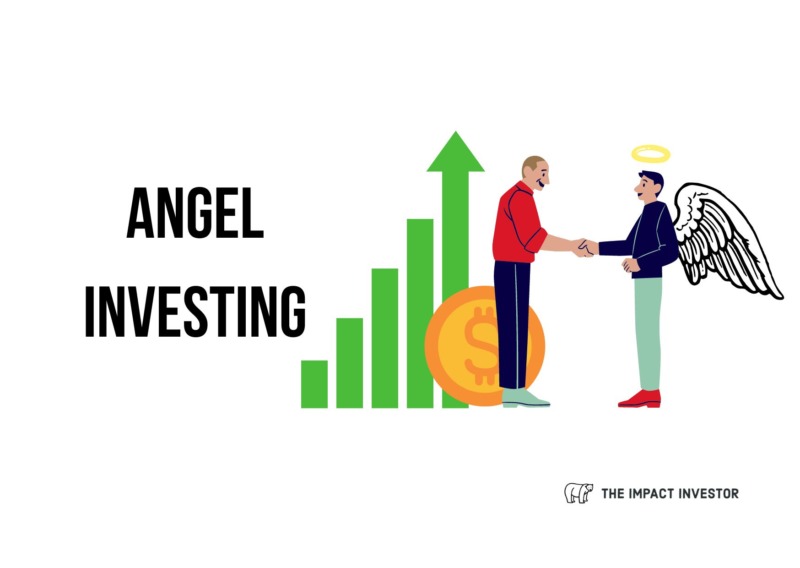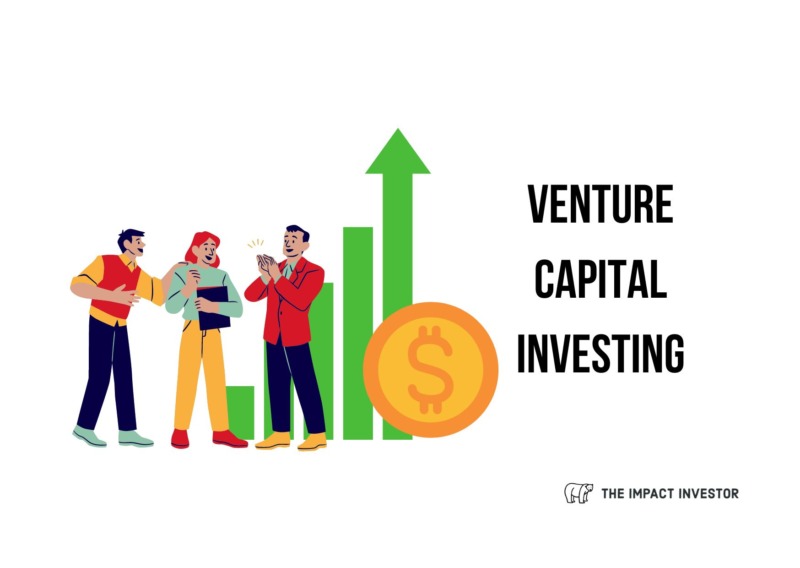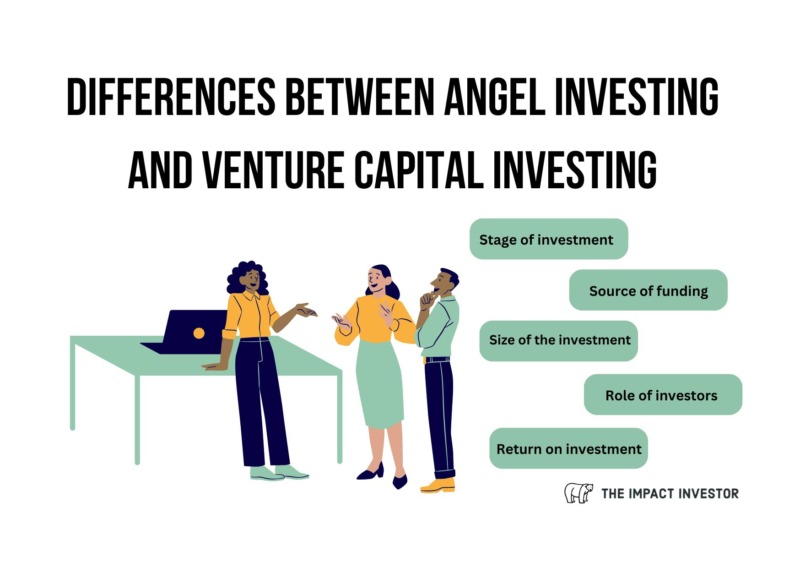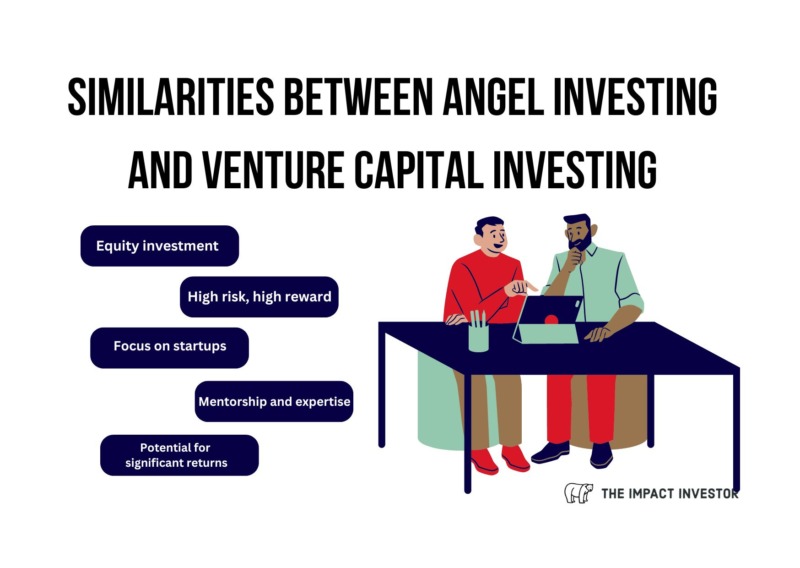Small businesses and startup companies need funding to grow from a business idea into a functional company capable of growth and able to earn profits. Unlike publicly-traded companies, which can sell shares, startup businesses need to find investors and venture capitalists who can provide the initial money to develop their operations.
This type of investing can bring excellent returns if the company achieves the desired growth. However, those familiar with investing in public companies might be confused by how early funding for startups and small businesses works.
It may be worthwhile to learn about this type of investing because there are many opportunities. In 2020, 10,800 companies received venture capital.
The first thing to know about early-stage investing is that the two major players in startup company development are angel investors and venture capitalists. These two types of investors provide funding, typically in exchange for an equity stake in the company. They hope that the early-stage businesses they invest in will grow and they can earn profits.
For example, angel investors and venture capitalists hope to hold their shares until they increase in value or sell them during the initial public offering if the company decides to trade publicly on the stock market.
An angel investor and a venture capitalist both invest in early-stage businesses. However, there are actually several important differences between the two.
Here is everything you need to know about the similarities and differences between so-called business angels and venture capital investors. Here’s a guide on angel investing vs venture capital and everything you need to know.
Table of Contents
- What is Angel Investing?
- What is Venture Capital Investing?
- Differences Between Angel Investing and Venture Capital Investing
- Similarities between Angel Investing and Venture Capital
- Advantages and Disadvantages of Angel Investment
- Advantages
- Disadvantages
- Advantages and Disadvantages of Venture Capital Investing
- Advantages
- Disadvantages
- When is Angel Investing a Better Option for Investors?
- When Is Venture Capital Investing a Better Option for Investors?
What is Angel Investing?

Angel investing involves putting money into small businesses and startups in their early stages, usually in exchange for equity shares. Angel investors are typically wealthy people willing to take on more risk with their own money in exchange for a higher potential return on investment (ROI). In recent years, angel investing has become more popular as a way for individuals to diversify their portfolios.
Some people who engage in angel investments take an active role in the company. They do not make final decisions about strategies or processes, but they aim to help startups by giving them advice as well as providing capital.
Angel investors are often wealthy individuals, though you may also find partnerships and more formal companies that engage in investing in companies at the earliest stage of their development.
What is Venture Capital Investing?

Venture capital investing is putting money into early-stage startups and growth-stage companies that have a chance of growing and making a lot of money back. Though individuals can make these investments, they are also done by venture capital firms made up of experienced investors and industry experts who give money and advice to new businesses in exchange for a share of ownership.
Venture capital funding typically comes along after a company has already proven itself. Perhaps the company has a successful prototype or has tested its service and received positive feedback from early clients. A venture capital firm usually does some due diligence to find proof of these early accomplishments.
When companies reach this round of funding, they are typically beyond the stage where an individual angel investor can afford to provide funding. However, the angel investor retains their equity after the venture capitalists add their funding.
See Related: Best Clean Energy Venture Capital Firms
Differences Between Angel Investing and Venture Capital Investing

Here is a look at the differences between angel and venture capital investing.
- Stage of investment: Angel investing usually focuses on early-stage startups, while venture capital investing is traditionally done in later-stage companies that are getting closer to selling their products or services.
- Source of funding: Angel investors are usually people with individual wealth willing to use their own funds for investment. Meanwhile, institutional investors, pension funds, endowments, and hedge funds often pay for venture capital.
- Size of the investment: Angel investments are usually smaller, ranging from a few thousand to several hundred thousand dollars, while venture capital investments can be anywhere from several million to hundreds of millions.
- Role of investors: Angel investors often play an active role in the startups they invest in by giving mentorship and advice. Though they may supply some expertise and try to influence company decisions, venture capital firms tend to stay out of the way and focus on providing money.
- Return on investment: Angel investors usually expect a higher return than venture capital firms, which are more focused on growth and long-term ROI. Their ultimate goal is typically to take the company public or sell it to a larger firm for a significant price.
- Due diligence: Investing in angels usually requires less formal due diligence than investing in venture capital, which can involve a lot of research and analysis. Venture capital firms may even test finished products or services with members of the target market before agreeing to fully fund the company.
Despite these differences, there are also some important similarities between the two investment types.
Similarities between Angel Investing and Venture Capital

The two investment activities have more in common with each other than they do with other forms of equity investment.
- Equity investment: Angel and venture capital investing both give new businesses money in exchange for a share of ownership.
- High risk, high reward: Both types of investments are high risk because startups have a heightened rate of failure, but they also have the potential for an exponential return on investment.
- Focus on startups: Both angel investing and venture capital investing are about giving money and help to startups that are just forming or in the early stages of development. Established companies do not need the type of initial investments that these early adopters provide. They will ask for funds from existing shareholders or issue new shares to cover the costs of expansion.
- Mentorship and expertise: Angel investors and venture capital firms often help startups with advice and guidance. They typically choose companies in their area of expertise. However, some early investors will have general business skills that they can use to help guide company growth while leaving the technical details of operations to the founders.
- Potential for significant returns: Both angel and venture capital investing can lead to substantial returns. Investors can sell shares in an initial public offering (IPO) or get a portion of the proceeds when a larger firm purchases the company.
- Regulations: Both angel investing and venture capital investing are subject to SEC regulations.
How can you decide which type of investment is the best fit for your financial plans? You can start by weighing the pros and cons of each.
See Related: Banks vs Credit Unions: What’s the Difference?
Advantages and Disadvantages of Angel Investment
Most people understand the high-risk, high-reward nature of investing in early-stage companies. However, the pros and cons of using your own funds on startups are more nuanced.
Advantages
Angel investors invest in startups to gain specific benefits.
- Startups often have high growth potential. This opportunity gives investors the chance to make a lot of money when they sell their shares after the company reaches its potential.
- Private equity provides the opportunity to diversify. This aspect is attractive for those whose portfolio primarily consists of stocks and bonds.
- Angels help people start their businesses when other funding isn’t available. In many cases, they can also play a role in how the company grows through advice or conditional funds.
- Unlike passive stock ownership, angel investment often involves hands-on involvement, giving the investor a measure of control over the growth of the company.
Of course, there are also drawbacks to this investment type.
Disadvantages
Here are some potential pitfalls investors need to consider.
- 90% of startups fail, meaning the risk is extremely high that the angel investor will either lose their capital or have to cash out at a loss.
- Shares of startups are hard to sell, making it difficult to get money out of the investment through the sale of shares.
- Angel investment takes a lot of time because the startup often needs advice.
- Startup investing is governed by rules and regulations that can be hard to understand. Legal advice is often necessary to ensure proper investment and protection.
Angel investors can enjoy good returns and a way to help entrepreneurs, but it can also be risky and take a lot of time.
Advantages and Disadvantages of Venture Capital Investing
As with angel investors, venture capitalists invest in companies understanding that there is a trade-off between benefits and potential pitfalls.
Advantages
Some of the benefits venture capital investors enjoy are similar to angel investors, while others are different.
- Startups often have high growth potential and the chance to make a lot of money when they leave the business.
- Unlike early-stage startups, those targeted by venture capital firms typically have proven success to help show their worth.
- Venture capitalists can influence the direction and decisions of the company.
- Access to capital lets investors help new businesses through all their growth stages.
Venture capital firms can make this type of investment more accessible.
Disadvantages
Venture capitalists invest in startups in pursuit of excellent returns on investment. However, they have to understand the drawbacks.
- Many startups, even those in the later stages of development, will eventually fail.
- The investment is essentially locked into place. If the company doesn’t do well, no one will want to purchase the investor’s shares.
- Regulations, such as those made by the Securities and Exchange Commission (SEC) require careful compliance.
- Though they have some influence, founders typically make final decisions, which could negatively impact company performance.
Though angel investors and venture capitalists invest in the same types of companies, there are some significant differences that both speculators and startups need to understand when they raise money.
See Related: Capitalism vs Socialism: What are the Differences?
When is Angel Investing a Better Option for Investors?
Here are the reasons why angel investing is better for investors and the companies they fund.
- Early-stage startups: Startups in their early stages often don’t have enough money or resources to achieve their goals. Angel investing can give them the capital and help they need to succeed.
- High-risk tolerance: Investors willing to take on high risk in exchange for more reward may find that angel investing is better than stocks or bonds, which offer modest potential gains in comparison.
- Knowledge: Angel investing may be a better choice for investors who want to be more involved in the growth and success of startups and want to take a more active role in development. They typically need business and industry knowledge to offer this type of guidance.
- Personal interests: An angel investor can use investments to champion specific causes. For example, a business angel who cares a lot about protecting the environment may put money into green technology startups.
Angel investing is a better choice for investors who want to put money into early-stage startups, are willing to take on more risk, want to be involved, and want their investments to reflect their interests and values.
When Is Venture Capital Investing a Better Option for Investors?
Here are the instances when venture capital investments are a better choice for investors.
- Later-stage startups: Investors who want to put money into later-stage startups with a proven track record and a clear path to commercialization should look into venture capital. The extra information can make these investments slightly less risky to people who understand the relevant industry.
- Larger amounts of money to invest: Venture capital investments usually cost between a few million dollars and hundreds of millions. Investors with access to this amount of capital or who are part of venture capital firms and funds can consider this type of investing.
- Hands-off approach: Venture capital firms usually don’t have much to do with the investments they make. Instead, they focus on providing money. Investors who do not want a big-time commitment would prefer venture capital investing.
- Potential for significant returns: Venture capital investments can lead to big returns compared to standard stock and bond returns. However, because angel investors get in earlier, they may enjoy higher profits.
As you can see, venture capital investing is a better choice for investors who want to put money into later-stage startups with a proven track record, make significant investments, set up a more-passive investment strategy, and enjoy the potential for substantial returns.
Related Resources
- Ways to Start Investing in Small Business
- How to Start Investing With Purpose
- How to Start Investing in Women-Owned Businesses
Kyle Kroeger, esteemed Purdue University alum and accomplished finance professional, brings a decade of invaluable experience from diverse finance roles in both small and large firms. An astute investor himself, Kyle adeptly navigates the spheres of corporate and client-side finance, always guiding with a principal investor’s sharp acumen.
Hailing from a lineage of industrious Midwestern entrepreneurs and creatives, his business instincts are deeply ingrained. This background fuels his entrepreneurial spirit and underpins his commitment to responsible investment. As the Founder and Owner of The Impact Investor, Kyle fervently advocates for increased awareness of ethically invested funds, empowering individuals to make judicious investment decisions.
Striving to marry financial prudence with positive societal impact, Kyle imparts practical strategies for saving and investing, underlined by a robust ethos of conscientious capitalism. His ambition transcends personal gain, aiming instead to spark transformative global change through the power of responsible investment.
When not immersed in finance, he’s continually captivated by the cultural richness of new cities, relishing the opportunity to learn from diverse societies. This passion for travel is eloquently documented on his site, ViaTravelers.com, where you can delve into his unique experiences via his author profile. Read more about Kyle’s portfolio of projects.
